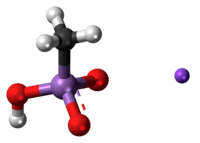Monosodium methyl arsonate
 | |
 | |
| Names | |
|---|---|
| IUPAC name
Sodium hydrogen methylarsonate | |
| Other names
Monosodium methyl arsenate; sodium methylarsonate; monosodium methane arsonate; methyl arsonic acid monosodium salt; EPA Pesticide Chemical Code 013803 | |
| Identifiers | |
| 3D model (JSmol) |
|
| Abbreviations | MSMA |
| ChemSpider | |
| ECHA InfoCard | 100.016.815 |
| PubChem CID |
|
| |
| |
| Properties | |
| CH4AsNaO3 | |
| Molar mass | 161.95 g/mol |
| Except where otherwise noted, data are given for materials in their standard state (at 25 °C [77 °F], 100 kPa). | |
| | |
| Infobox references | |
Monosodium methyl arsenate (MSMA) is an arsenic-based herbicide. It is an organo-arsenate; less toxic than the inorganic form of arsenates. It is one of the most common and cost effective herbicides used against weeds in agriculture. MSMA products are unique in that they combine selectivity, low weed-resistance, and cost-efficiency. MSMA is an herbicide used to control a wide spectrum of hard to control grass and broad-leaf weeds including some weeds that are resistant to the herbicide Glyphosate. MSMA products are effective, cost efficient and selective. Weed-resistance to herbicides is on the rise due to both the repeated use of the herbicides and the introduction of genetically modified crops. These crops are endowed with natural resistance to certain herbicides, a resistance which they may impart to non-crops through cross pollination. There are very few, if any, new herbicides capable of economically combating the resistance problem. With the exception of isolated cases of common cocklebur Xanthium strumarium, no resistance build-up has occurred with the weeds that MSMA controls. MSMA provide post-emergent selective annual grass and yellow nutsedge control, in cool season . MSMA is an effective treatment to control Convolvulaceae (morning glory) and Cyperus rotundus (nutgrass). MSMA products are non-flammable, practically not corrosive, and easy to handle.
Trade names include:
- Target 6 Plus
- Target 6.6
- MSMA 6 Plus
- MSMA 6.6
References
- Agency for Toxic Substances & Disease Registry. "Arsenic Toxicity Case Study". Environmental Health and Medicine Education. Retrieved 25 December 2013.
- MAA Research Task Force. "Organic Arsenical Products Task Force".
- National Library of Medicine. "Sodium Methanearsonate". HSDB Database.